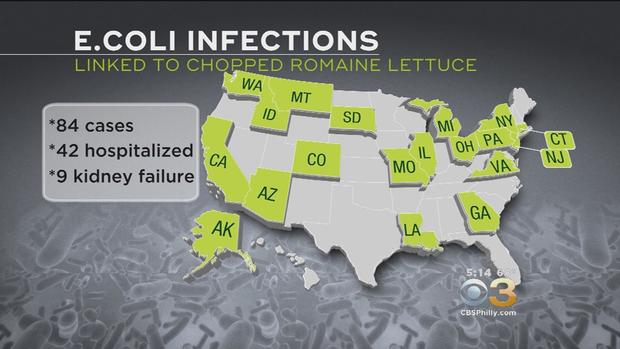19 States, Including Pennsylvania, New Jersey, Impacted By E. Coli Romaine Lettuce Outbreak
PHILADELPHIA (CBS) — Health warnings about contaminated romaine lettuce are expanding as officials continue working to determine why this E. coli strain is causing a higher percentage of hospitalizations.
Study: Regular Morning Meal Could Help You Stay Slim
E. coli infections linked to romaine lettuce continue to grow across the country. Locally, there are 12 confirmed cases in Pennsylvania linked to the strain and seven in New Jersey.
Government health officials are still trying to determine the source of an E.coli outbreak linked to romaine lettuce. The CDC cautions that consumers should not eat any type of romaine grown in Yuma, Arizona.
"We are advising people if they can't confirm that their lettuce did not come from Yuma, Arizona, that they go ahead and throw it out. Don't buy it; don't eat it," said Dr. Laura Gieraltowski, of CDC's Foodborne Outbreak Response Team.
The CDC is now reporting 84 people in 19 states have been infected. Half were hospitalized, including nine with kidney failure.
People with E. coli infections usually get sick three to four days after eating a contaminated food.
South Jersey Twins Paving The Way For Cancer Research
"They get bloody diarrhea, stomach cramps and their illness typically lasts about a week," Dr. Gieraltowski said. "This E. coli outbreak, we're seeing a higher proportion of ill people being hospitalized."
Romaine lettuce has a short shelf life. Most sold in the U.S. comes from Arizona in the winter but production there is wrapping up and now shifts to California.
"We can hope that a lot of this lettuce will be out of shelf-life and be off the shelves soon and that a lot of restaurants and grocery stores and people in their homes have heard our advice and, so, we're hoping that the illnesses will start to taper off," Dr. Gieraltowski said.
Health officials say you should talk to your doctor if you have symptoms of an E. coli infection and report your illness to your local health department.




